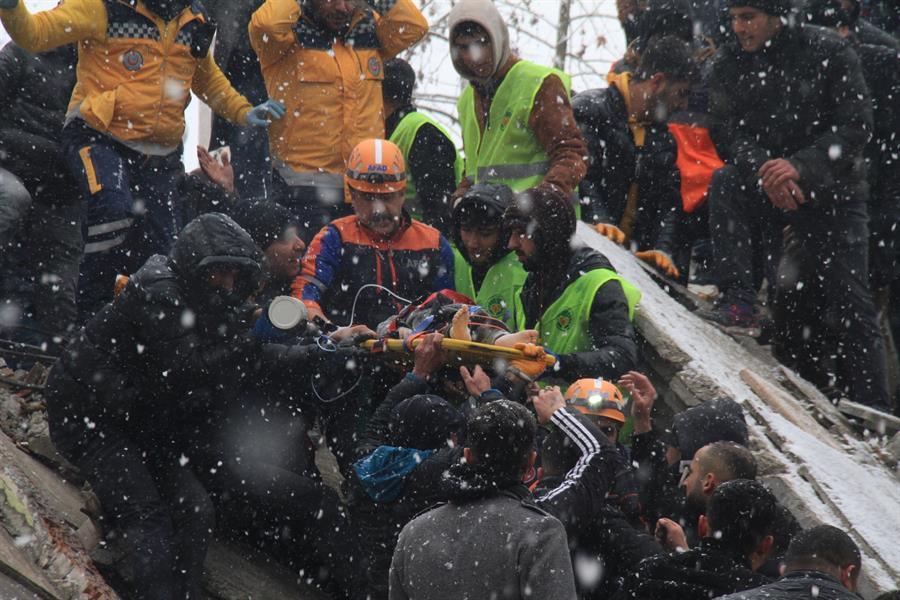
In order to organize and control the works in 10 provinces affected by the earthquake, 10 more governors were appointed in addition to their own governors, President Recep Tayyip Erdoğan said.
While AFAD and Red Crescent were immediately dispatched to the region, the Turkish Army’s forces and the various municipalities’ units and institutions with disaster infrastructure were called to duty.
Currently, 9,000 personnel are carrying out search and rescue works in the region, Erdoğan stated, adding that this number is constantly increasing with those reaching the earthquake zone from the other regions.
Several ministers arrived in the cities in the earthquake zone and started to coordinate the work on-site, he noted.
Starting from nearby regions, search and rescue teams and equipment were sent to the region from all over the country, while the rescue efforts for the people stuck under the rubble continue uninterruptedly considering the cold weather.
In order to support the search and rescue efforts in the quake area, 400 rescue and medical personnel from various units in the southern province of Antalya were dispatched to the scene.
The health personnel assigned from the Defense Ministry and the Health Ministry departed from Ankara to the region with two military ambulance planes.
Along with the search and rescue teams from several districts of Istanbul, a group of soldiers from the Tuzla Gendarmerie Command went to the region to assist in the efforts.
Besides rescue teams, blankets, food, and psychological support teams from several provinces of the country were also sent to the region.
After the quake, the country issued a level-4 alarm, which includes a call for international aid.
“Following a discussion with the Foreign Ministry, international assistance was called for the search and rescue through the ERCC (Emergency Response Coordination Centre),” AFAD stated.
Municipalities and civilians from all over Türkiye have mobilized to support the recovery of disaster victims and the rescue efforts of those still under the rubble following a powerful earthquake in the country’s south.
“In order to meet urgent needs, 250 million Turkish Liras in aid was transferred to our Social Assistance and Solidarity Foundations in 10 provinces at the first stage,” the Family and Social Services Ministry has announced.
Istanbul Governor Ali Yerlikaya stated that search and rescue teams and aid materials were sent to the quake-hit region from the megacity.
“A total of 80 AFAD [the Disaster and Emergency Management Presidency] officers, 27 municipalities and nongovernmental organizations, 968 search and rescue volunteers, four K9 dogs, two trucks and relief supplies set out from Istanbul,” the governor informed.
Teams from Zonguldak, Bartın and Karabük were also sent to the region. A total of 80 personnel from Turkish Hard Coal Institution’s rescue team, 28 personnel from AFAD, 18 personnel from the Kdz Ereğli Municipality, five personnel from ERİDAK (Ereğli Firefighters Nature Sports Search and Rescue Association) and 28 personnel from UMKE (National Medical Rescue Team) moved to the region from the northern provinces.
At the first stage, AFAD’s İzmir Provincial Directorate assigned 57 personnel in Kahramanmaraş, the epicenter of the quake, and the nearby provinces of Diyarbakır and Osmaniye.
Moreover, the municipalities from the central Anatolian provinces of Kayseri and Niğde also sent trucks, diggers, excavators, cranes, logistics tankers, fire trucks, funeral vehicles and police officers to the region, they said in written statements.
The citizens donated coats, cardigans, sweaters, socks, boots, blankets, heaters and diapers to be sent to the citizens affected by the earthquake, they added.
National blood stocks are available for the first stage shipment to the quake-hit area, said Kerem Kınık, the head of the Turkish Red Crescent, but invited all citizens across the country to donate blood for additional needs that may occur in the coming hours.
The organization is also enforces the blood banks of the hospitals within the scope of a separate plan for the products that may be needed in the region.
Besides rescue teams, blankets, food, and psychological support teams from several provinces of the country were also sent to the region.